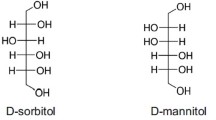Summary
In acute experiments Triamterene caused moderate diuresis and natriuresis, the onset of action being apparent at the end of 1 hour and lasting for 6 hours. Urinary potassium content was diminished. Urinary chloride and bicarbonate were increased. Urinary pH rose.
In oedematous patients, moderate diuresis and natriuresis with diminution of urinary potassium content were also observed. The diuresis was less than that induced by chlorothiazide. The addition of Triamterene to chlorothiazide accentuated existing diuresis. It also reduced the urinary potassium loss resulting from chlorothiazide. The combination of Triamterene with spironolactone produced satisfactory diuresis.
The greatest diuresis followed the administration of all 3 drugs simultancously.
Similar content being viewed by others
References
Baba, W. I., Tudhope, G. R. and Wilson, G. M. (1962a).Brit. Med. J., 2, 756.
— (1962b).Ibid., 2, 760.
Edwards, K. D. G. and Whyte, H. M. (1958).Aust. J. exp. Biol. med. Sci., 36, 383.
Laragh, J. H., Reilly, E. B., Stites, T. B. and Angers, M. (1961).Fed. Proc., 20, 410.
Schales O. and Schales, S. S. (1941).J. Biol. Chem., 140, 879.
Skeggs, L. T. (1957).Amer. J. Clin. Path., 28, 311.
Van Slyke, D. D. and Neill, J. M. (1924).J. Biol. Chem., 61, 523.
Wiebelhaus, V. D., Weinstock, J., Brennan, F. T., Sosnowski, G. and Larsen, T. J. (1961).Fed. Proc., 20, 409.
Author information
Authors and Affiliations
Rights and permissions
About this article
Cite this article
Bourke, E., Counihan, T.B., Farrell, I. et al. Clinical trial of the diuretic triamterene. Ir. J. Med. Sc. 40, 57–65 (1965). https://doi.org/10.1007/BF02943824
Published:
Issue Date:
DOI: https://doi.org/10.1007/BF02943824




